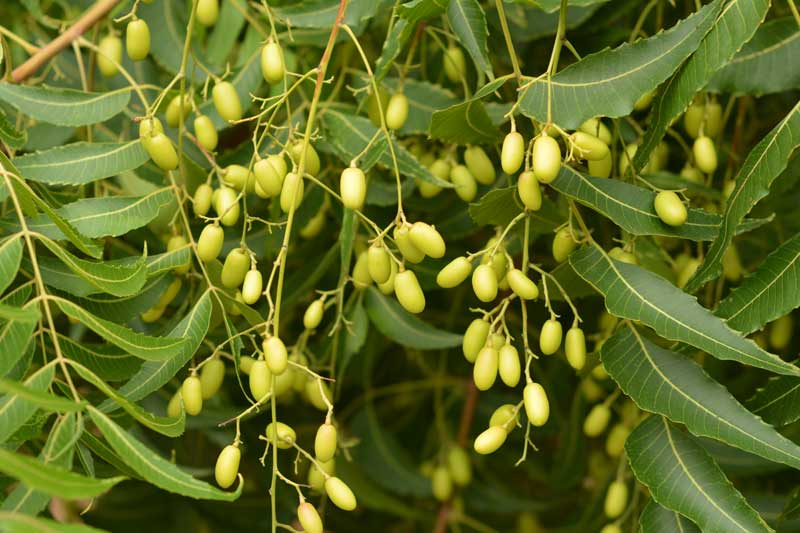
Azadirachta indica A.Juss.
( National Innovation Foundation - India )
Practice to Control Pests of Coconut Plant
By : Mr. Henry Louis ,
Kanniyakumari,
Tamil Nadu
Innovation Description
Mr. Henry Louis from Kanyakumari, Tamil Nadu has developed an eco-friendly and very effective herbal pesticide to control pest of coconut plant.
Targeted pest: Coconut Pests
Targeted crop: Coconut
Ingredients: Tephrosia purpurea (L.) Pers (Kolingi), Vitex negundo L.(Notchi) , Azadirachta indica
A.Juss. , Millettia pinnata (L.) Panigrahi, Curcuma longa L.(Turmeric ), Allium sativum L., Lantana camara L., Catharanthus roseus (L.) G.Don, Senna auriculata (L.) Roxb., Annona squamosa L.
Methodology: Take whole plant of Kolingi and Cassia auriculata, Leaves of each Notchi, Lantana, c, Millettia pinnata, Annona squamosa, Neem, rhizome of Turmeric and bulb of Garlic (Allium sativum). Mix all and grind to extract juice. Use 10-15 ml of this stock per liter of water to spray on the plants.
Suggested reading(s):
Ahmed, S., & Grainge, M. (1986). Potential of the neem tree (Azadirachta indica) for pest control and rural development. Economic botany, 40(2), 201-209.
Begum, N., Sharma, B., & Pandey, R. S. (2013). Calotropis procera and Annona squamosa: potential alternatives to chemical pesticides. Current Journal of Applied Science and Technology, 254-267.
Damalas, C. A. (2011). Potential uses of turmeric (Curcuma longa) products as alternative means of pest management in crop production. Plant omics, 4(3), 136-141.
Debra, K. R., & Misheck, D. (2014). Onion (Allium cepa) and garlic (Allium sativum) as pest control intercrops in cabbage based intercrop systems in Zimbabwe. IOSR journal of agriculture and veterinary science, 7(2), 13-7.
Dua, V. K., Pandey, A. C., & Dash, A. P. (2010). Adulticidal activity of essential oil of Lantana camara leaves against mosquitoes. Indian journal of medical research, 131(3), 434.
Karunamoorthi, K., Ramanujam, S., & Rathinasamy, R. (2008). Evaluation of leaf extracts of Vitex negundo L.(Family: Verbenaceae) against larvae of Culex tritaeniorhynchus and repellent activity on adult vector mosquitoes. Parasitology research, 103(3), 545.
Kumar, D., Dhamodaran, P., Nilani, P., & Balakrishnan, N. (2012). Larvicidal activity of Tephrosia purpurea,(L) against the Larvae of Culex quinquefasiciatus. Journal of applied pharmaceutical science, 2(7), 219.
Kumar, P., Sundaravadivelan, C., Kumar, D. V., & Babu, A. (2016). Enhanced Acaricidal Activity of Senna auriculata and Ocimum tenuiflorum Extracts with the Addition of Adjuvant against Red Spider Mite, Oligonychus coffeae Nietner (Acarina: Tetranychidae) Infesting Tea. Journal of tea science research, 6.
Perumalsamy, H., Jang, M. J., Kim, J. R., Kadarkarai, M., & Ahn, Y. J. (2015). Larvicidal activity and possible mode of action of four flavonoids and two fatty acids identified in Millettia pinnata seed toward three mosquito species. Parasites & vectors, 8(1), 237.
Singh, D., Mehta, S. S., Neoliya, N. K., Shukla, Y. N., & Mishra, M. (2003). New possible insect growth regulators from Catharanthus roseus. Current science, 84(9), 1184-1186.
For More Details Please Contact on enquiry[at]nifindia[dot]org